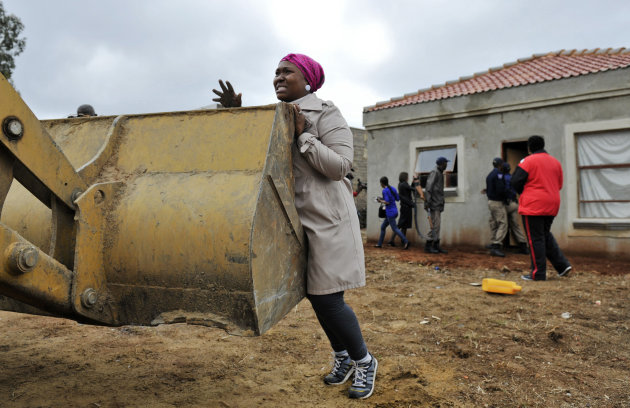By Ryan Aliman
Impunity Watch Reporter, Africa
PRETORIA, South Africa – On Thursday, the housing department of the Gauteng province began demolishing homes that it said were constructed on illegally sold land, despite efforts by protesters to stop the demolitions.

37 out of 113 targeted houses have been bulldozed so far. Since then, residents in Lenasia Extension 13, about 30 kilometers (20 miles) southwest of Johannesburg, protested against the demolition barricading roads and setting tires on fire.
The protesters clamored for due process. They claim that although their houses were on the list to be demolished, they were never given notice contrary to a public statement issued by the housing department. One of the things the government could have done, they said, was to work out a deal with them that would have allowed them to properly purchase the houses and lots.
Their rally fell on deaf ears, however. Bulldozers, escorted by armored police vehicles, made its way amid the protesters’ makeshift barricades and continued to smash the houses on their path. The residents could only watch in vain as their homes were turned into rubble.
In one instance, the police had to drag a woman who was carrying a baby out of her house, but that did not stop her from trying to save her property. Once outside, she ran and stood in front of the bulldozer that was about to tear down her house, pressing her hands against it and begging the authorities to spare her home. She cried, “Please, please, please, don’t do it”.
The provincial spokesperson, Motsamai Motlhaolwa, said that the housing department was merely implementing a court order. “We are evicting people from a land that belongs to the department,” he said. He maintains that the land is intended for future government housing projects.
Motlhaolwa also claims that the title deeds presented by some of the residents were fake. Citing an investigation conducted by the housing department’s anti-fraud and corruption unit, he said that “fraudsters sold several stands (for amounts) ranging from 2,500 rand ($285) to 95,000 rand ($10,860) and issued buyers with fraudulent deeds of sale which bore the department’s official logo.” In fact, he added, the court ordered the residents not to build houses on the land in 2006, but a syndicate had convinced them otherwise.
Sam Mfupa, one of the residents whose house was demolished, asserted that the government should have arrested the people who sold them the land beforehand. He speculated that members of the syndicate might be “con artists from the housing department” itself.
Police spokesman Kay Makhubele retorted that residents should lay charges if they have evidence of corruption and their homes were destroyed.
According to Spokesperson Motsamai Motlhaolwa, owners of the demolished houses would not be compensated for their losses.
For further information, please see:
The Peninsula – Demolition of houses sparks protests in S Africa – 10 November 2012
The Associated Press – SAfrica police destroy illegal homes – 9 November 2012
News24 – Anger over Lenasia demolitions – 9 November 2012
News24 – Lenasia woman hysterical over demolition – 9 November 2012
IOL News – Lenasia locals protest housing demolition – 9 November 2012



